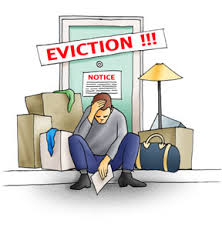记忆方法
将“eviction”分解为“e”+“vice”(副词,意为“像”或“如同”)+“tion”(名词后缀)。想象一场驱逐(eviction)就像“如同”(vice)一场战争,这场“战争”导致了某人或某物被驱逐出去。这样的故事联想可以帮助记忆这个单词的含义。
以上内容由AI生成, 仅供参考和借鉴
英语词源
- eviction (n.)
- mid-15c., from Middle French éviction, from Late Latin evictionem (nominative evictio) "recovery of one's property (by judicial decision)," noun of action from past participle stem of evincere, literally "overcome, conquer" (see evict).
权威例句
- 1. Thomas now faces eviction from his squat.
- 托马斯现在要被从他占住的房子里驱赶出来。
- 2. The family have won a temporary reprieve from eviction.
- 这个家庭暂时免于被逐出.
- 3. He claimed damages for unlawful eviction.
- 他要求对非法驱逐作出赔偿.
- 4. She has received an eviction order from the council for non-payment of rent.
- 因为没有支付租金,她已经收到了市政会发给她的驱逐令。
- 5. The remaining "New Age" travellers left Kerry just 30 minutes before the deadline set for their eviction.
- 就在离被驱逐的最后期限仅有30分钟时,其余的“新世纪”旅行者也离开了凯里。
